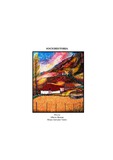| dc.rights.license | http://creativecommons.org/licenses/by-nc-sa/3.0/ve/ | es_VE |
| dc.contributor.author | Briceño Reyes, Dimitri | |
| dc.date.accessioned | 2019-02-13T16:53:26Z | |
| dc.date.available | 2019-02-13T16:53:26Z | |
| dc.date.issued | 2019-02-13 | |
| dc.identifier.issn | 1316-7790 | |
| dc.identifier.uri | http://www.saber.ula.ve/handle/123456789/45639 | |
| dc.description.abstract | A raíz de la caída de la dictadura de Marcos Pérez Jiménez,
se inicia en Venezuela el período de la Democracia Representativa;
cambios importantes se suceden en la estructura económica social de
la nación. Diversas dificultades debe enfrentar la naciente democracia
ante los intentos de grupos de izquierda y de derecha que llevan a cabo
acciones que se materializan en alzamientos militares por parte de
sectores que se identificaban con la dictadura y con grupos de izquierda que protagonizaron
lo que se llamó la lucha armada; entusiasmados por la Revolución Cubana, trataron de calcar ese modelo
político para imponerlo en Venezuela. Para defender el sistema republicano los
partidos políticos más importantes con sus líderes tradicionales suscribieron un
acuerdo que se llamó el Pacto de Punto Fijo, que consistía
en defender el sistema democrático - representativo y salvaguardar las
libertades conquistadas. Durante estos 15 años, de estudio, objeto del
presente artículo se llevaron a cabo tres procesos electorales y se estrenó una nueva Constitución. | es_VE |
| dc.language | Spanish | |
| dc.language.iso | es | es_VE |
| dc.publisher | SaberULA | es_VE |
| dc.rights | info:eu-repo/semantics/openAccess | es_VE |
| dc.subject | Democracia | es_VE |
| dc.subject | Lucha armada | es_VE |
| dc.subject | Elecciones | es_VE |
| dc.subject | Crisis políticas | es_VE |
| dc.title | Historia política venezolana. Reflexiones breves: 1959-1973 | es_VE |
| dc.title.alternative | Political venezuelan history: Brief reflections 1959-1973 | es_VE |
| dc.type | info:eu-repo/semantics/article | es_VE |
| dcterms.dateAccepted | 26/06/2017 | |
| dcterms.dateSubmitted | 24/04/2017 | |
| dc.description.abstract1 | In the wake of the fall of dictatorship of Marcos Pérez Jiménez,
Venezuela starts the period of representative democracy; major changes occurred in the
social economic structure of the nation. The nascent
democracy must face various challenges to the attempts of left and right
groups that carry out actions that are materialized in military uprisings
by sectors who identify with the dictatorship and leftist groups that staged what was called
the armed struggle; excited by the Cuban revolution, they tried to trace this political model
to impose it in Venezuela. To defend the Republican system the most important political parties with
their traditional leaders signed an agreement called the Pact of Punto
Fijo, which was to defend the democratic representative system to safeguard conquered freedoms.
During these 15 years, three elections were
held and premiered a new Constitution. | es_VE |
| dc.description.colacion | 107-131 | es_VE |
| dc.description.email | dimitrir43@gmail.com | es_VE |
| dc.description.frecuencia | Semestral | |
| dc.description.paginaweb | http://www.saber.ula.ve/agora/ | |
| dc.identifier.depositolegal | pp199802ME291 | |
| dc.identifier.edepositolegal | ppi 201202ME4022 | |
| dc.identifier.eissn | 2244-8454 | |
| dc.publisher.pais | Venezuela | es_VE |
| dc.subject.institucion | Universidad de Los Andes | es_VE |
| dc.subject.keywords | Democracy | es_VE |
| dc.subject.keywords | Armeds truggle | es_VE |
| dc.subject.keywords | Elections | es_VE |
| dc.subject.keywords | Politica crisis | es_VE |
| dc.subject.seccion | Revista Ágora-Trujillo: Artículos | es_VE |
| dc.subject.thematiccategory | Ciencias Económicas y Sociales | es_VE |
| dc.subject.tipo | Artículos | es_VE |
| dc.type.media | Texto | es_VE |


